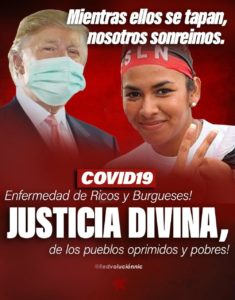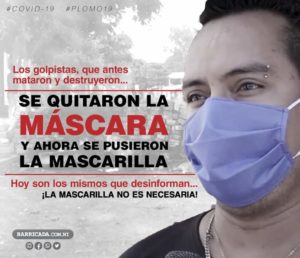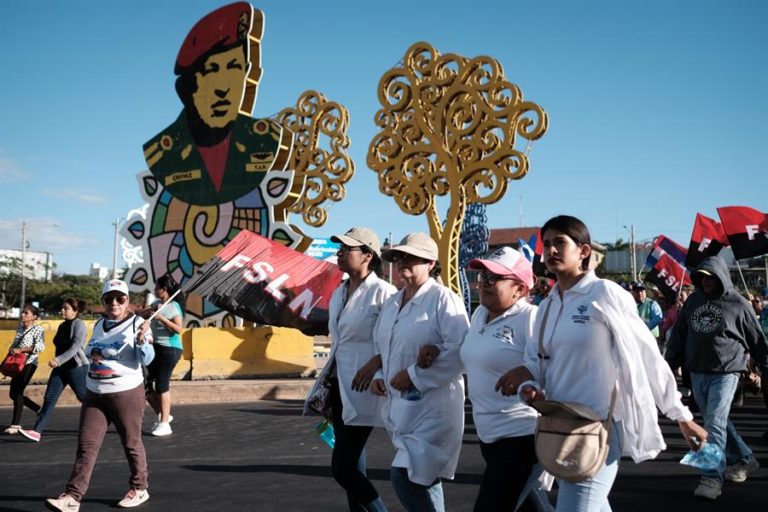“Amor en los tiempos del covid-19” march, organized by the government. Photo: EFE.
Nicaragua and the dance of horrors in the struggle against COVID 19
By Humberto Meza*
This article is not an optimistic text, despite its festive title, nor does it document best practices in the face of the current pandemic. It can be read as a complaint or just as an expression of the need to expose the sequence of criminal errors made by the Ortega regime since the virus SARS-CoV2 outbreak in Nicaragua, one of the poorest countries in Latin America.
Just over two years ago, Nicaragua popped back up in the lenses of the international media due to the brutal violence the dictatorship (led by Daniel Ortega and his wife Rosario Murillo) employed in response to street demonstrations against pension reform. The Inter-American System and the main human rights organizations of the world accused Ortega and Murillo of committing crimes against humanity, as police repression left at least 320 protesters dead and more than 100 political prisoners subjected to solidly documented torture. This brutality included the murder of Brazilian doctor, Rayneia Lima. None of the deaths that occurred in 2018 were investigated or was subject to any legal action.

This repression is paradoxical, at least, when one takes into consideration the narratives employed and political bets laid down by the regime since its beginnings. Daniel Ortega had been elected president in 2006, more than a decade after the Sandinista Popular Revolution had ended. In his electoral campaign, his party, the Sandinista National Liberation Front (FSLN), was leading the penal reform initiative in Congress which sought to criminalize abortion in all its forms. Once the government got underway in 2007, Ortega doubled down on his “pro-life” narratives, and consolidated these with the government’s official slogans of “Christian, Socialist and Solidaristic”. This narrative deepened the confrontations already accumulating between the country’s feminist movements and the government, to the point where several feminist leaders were arrested during the brutal repression of 2018.
The Nicaraguan people and society, in general, have not yet recovered from the trauma of the dictatorial violence of two years ago. We can already glimpse, however, a new circus of horrors that may be on the country’s horizon due to the government’s wrong decisions in the face of the COVID-19 pandemic. Since the first week of March, when the first positive cases in Central America were confirmed (beginning with neighboring Costa Rica), the Ortega-Murillo government chose to do the exact opposite of what the WHO recommends.
The government’s first decision was to call for a public demonstration, held on March 14th, to celebrate the “health and preparations of this good government” in the face of the pandemic. Thousands of civil servants were forced to take part in a march along the main streets of the capital Managua without any protection measures, while high-level public authorities were absent.
It must be said, moreover, that Daniel Ortega has not been seen publicly for more than a month. He has not even made a statement or participated in a press conference to present his government’s plans to face up to the crisis. The regime’s only statements are transmitted through official communiqués or in the daily announcements on Radio Nacional made every day at noon by Rosário Murillo, Vice President and First Lady.
One of these official communiqués informed the world that Nicaragua’s borders will not be closed, that classes at schools and universities, as well as commercial activities, will be maintained, and that there will be no quarantine. After the March 14th march, new decisions were made public: the announcement of the “Summer Plan” to celebrate Holy Week and “receive tourists”, a call for a massive public event with the “mandatory presence” of teachers and students in order to celebrate the 40 Years of Literacy. A “Carnival” was even announced for the tourist city of Granada, as well as the election of the “Summer Girl” in the capital Managua.
According to a survey by the Central American Integration System (SICA), Nicaragua is the only country not complying with basic WHO measures, particularly those regarding quarantine, suspension of classes, restrictions on public events, and restriction of flights and on in-coming foreigners. The country only carries out border surveillance activities and epidemiological protocols at the national level.
These bad decisions combine with precarious sanitation conditions in urban neighborhoods, and with continued secrecy and a lack of clarity on the part of the Executive regarding prevention plans for coping with COVID in the country (read in Spanish). For more than two weeks, the regime did not confirm even one positive case in Nicaragua, even though the surrounding region already had 259 cases and 4 deaths, especially in Panama (137 cases) and Costa Rica (87).
In the daily radio announcements on March 19th and 20th, Murillo reported the first two and “only” positive cases in Nicaragua. In doing so, she revealed the conditions of one of the infected patients by publicly saying that treatment “would be complicated”, as the patient is also HIV positive. The patient died on March 26th, but the Ministry of Health chose to emphasize stigma by stating that the death was particularly due to the patient’s HIV status (read in Spanish). In this way, Murillo and the health authorities not only violated the law that prohibits exposing people living with HIV, but have also tried to downplay the coronavirus’ high levels of contagiousness and lethality.

Even so, Nicaraguans who know health professionals have been spreading news about the virus via social media, reporting that the country has many more positive cases than those reported by the State. Rumors have circulated that a director of a public hospital in Managua has been fired for publicizing COVID diagnoses; that nurses and doctors are obliged to not use masks or alcohol gel in order to “not create a panic”; and that death certificates are being modified so that there are no COVID deaths record. This information, however, cannot be considered reliable given that it has been produced and proliferates in a scenario where public, clear, and safe information is non-existent.
As there has been no government response plan to COVID, Nicaraguan have had to take care of themselves, acting in an environment of little to no information. The news that the first positive case had been confirmed led people to make a run on the country’s food markets. Currently, every person or family is deciding for themselves how to prevent infection and transmission. There is no way for one to be optimistic in the face of this veritable horror show. The pandemic may well be catastrophic for Nicaragua. What remains is international denunciations, such as that which was presented a few days ago to the WHO by a coalition of social movements and parties opposed to Ortega (read in Spanish). There also remains the expectation that this regime that not only physically eliminates opponents and critics, but also endangers the lives of its citizens in general, will one day come to an end and that those who lead it will be effectively punished.
*The author is Nicaraguan, a political scientist, and researcher at the Federal University of Rio de Janeiro (UFRJ).
Translation by Thaddeus Blanchette.

